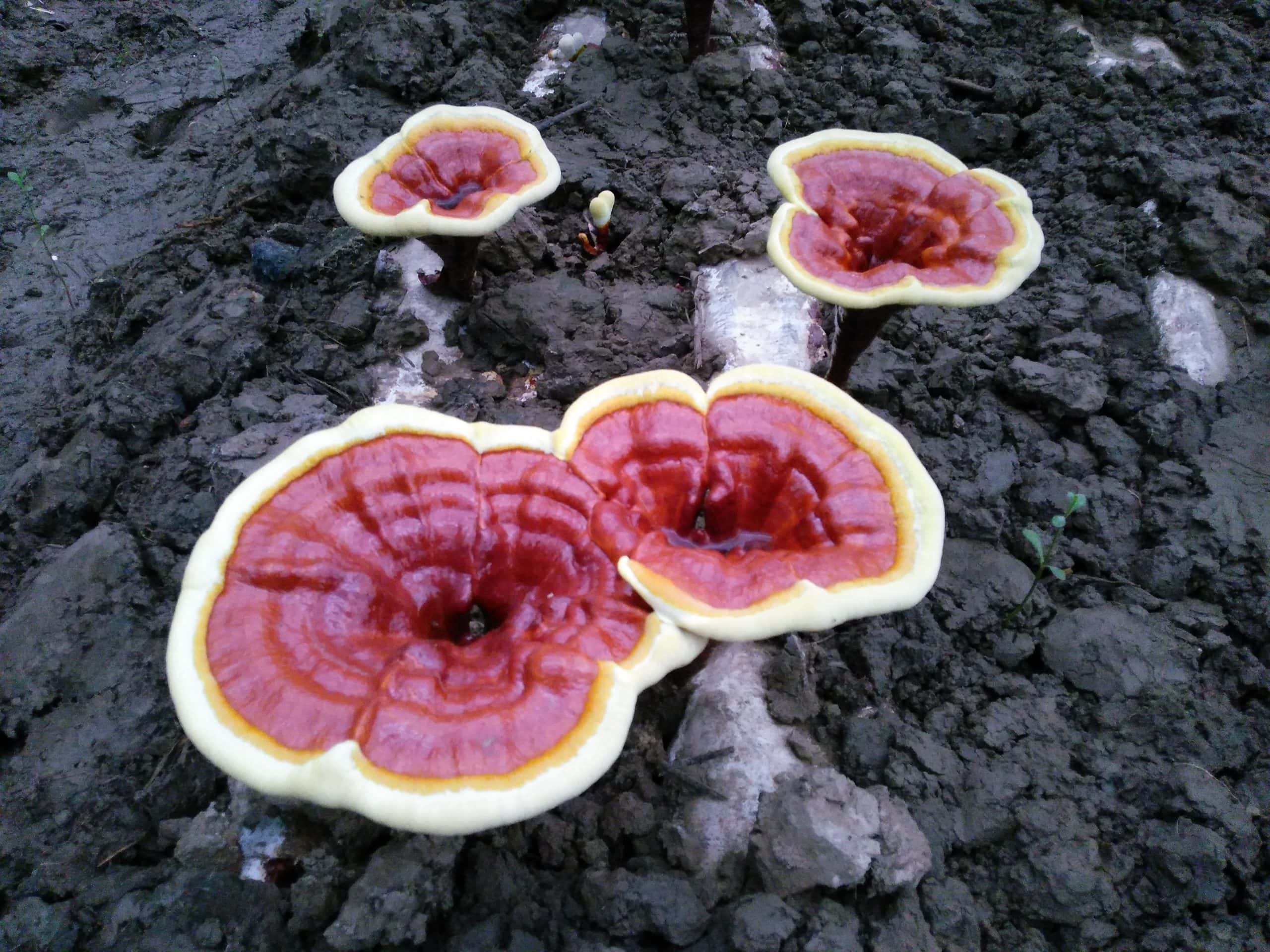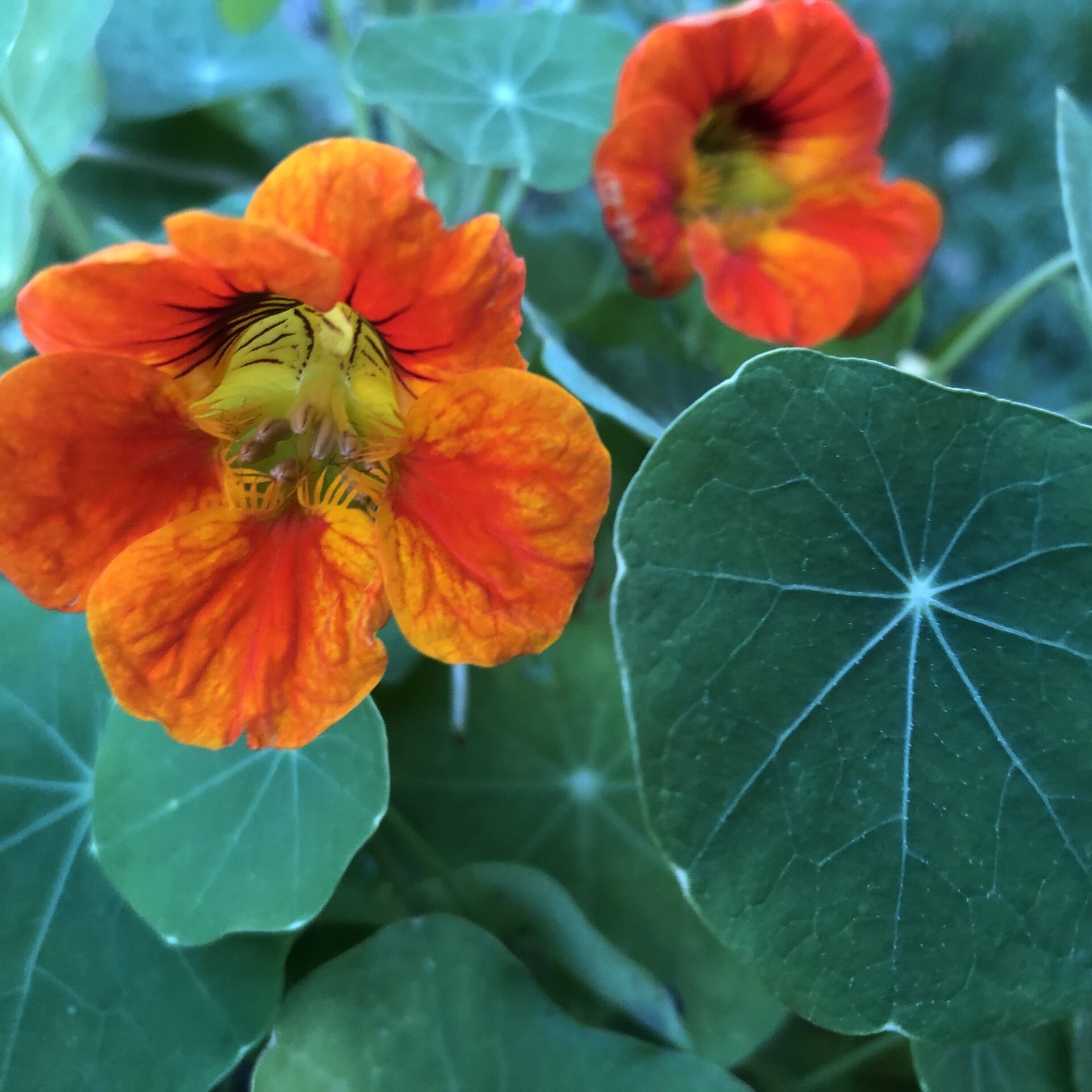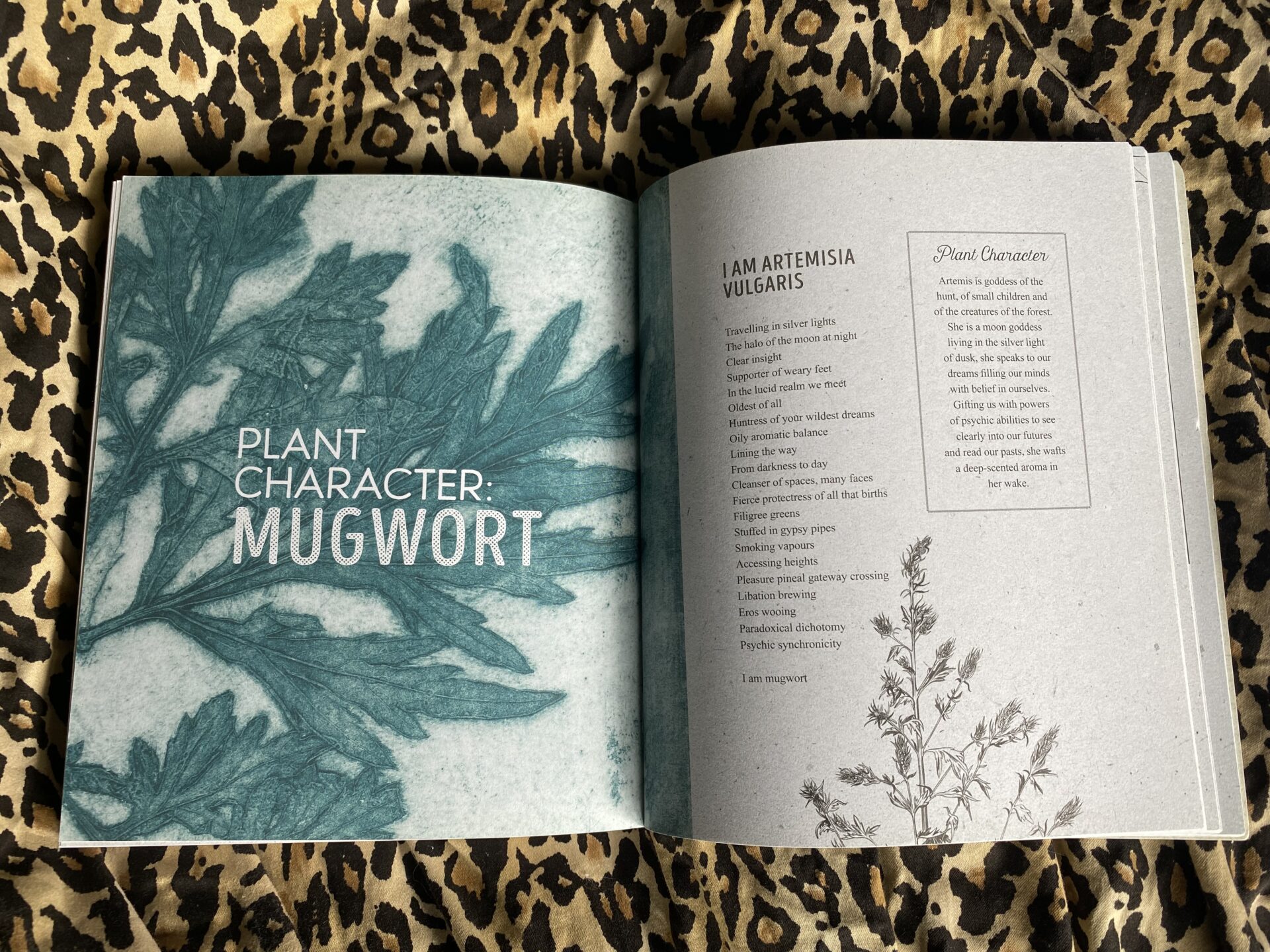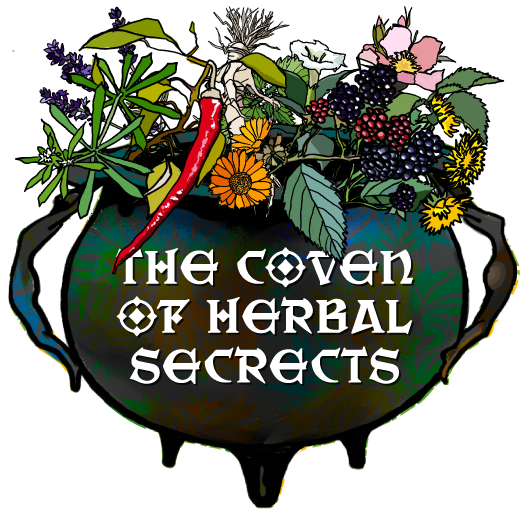It is mushroom season which is an extremely exciting time for us Seed Sistas we love the Fungal world and are especially interested in all the medical ones that fill our forests. Here Mycologist and author Martin Powell tells us all about his top tips about Reishi……

A biochemist by training, Martin Powell later studied Chinese language and then Traditional Chinese Medicine in the UK and China before mushrooms took over his life! As well as being the author of “Medicinal Mushrooms, The Essential Guide” (2013) and “Medicinal Mushrooms – A Clinical Guide” (2nd Edition 2014) he is the formulator the MycoNutri range of mushroom supplements ( www.myconutri.com).
He continues to lecture extensively on the health benefits of mushrooms and is in the process of launching a magazine on these amazing entities that people can sign-up to receive notification of on: www.mycologypress.com.
Take it away Martin……..
People often ask me what my favourite mushroom is and although there are many I think are amazing the one I take on a daily basis is Reishi.
My clinical background is in Chinese medicine and mushrooms have always formed an important part of its materia medica, none more so than Reishi, known in Chinese as Ling Zhi.
If we look at the Chinese characters that form its name we see that Zhi (芝)refers to a plant or herb with life-giving properties while Ling (靈), often translated as ’spiritual’, is in fact composed of three parts representing rain, shouting and shaman, thus representing a shaman shouting incantations to invoke rain in periods of drought.
The Chinese characters for Ling Zhi thus convey the idea of Reishi being ’supernatural’, ’numinous’ or ’magical’ and also allude to the role of mushrooms in the shamanic medicine of Chinese pre-history.
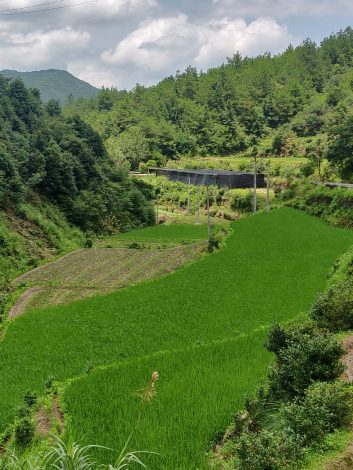
Reishi Farm
The Shennong Ben Cao Jing the earliest materia medica of which we have records (2nd century AD), accords it a place in the highest category of herbs that can safely be taken for extended periods of time and says of it that ‘long term consumption renders the body light and graceful and prevents ageing so that one becomes long lived like the Immortals (Xian)’ while in the Shuowen [jiezi] from around the same time Xu Shen says that [ling]zhi, is “nothing else than the herb of Spirits and Gods.”
At that time Ling Zhi was split into different categories according to its colour in line with Five Element theory:
- Red lingzhi (cinnabar lingzhi)
- Black lingzhi (dark lingzhi)
- Blue-green lingzhi (dragon lingzhi)
- White lingzhi (jade lingzhi)
- Yellow lingzhi (golden lingzhi)
- Purple lingzhi (tree lingzhi)
Today it is the Red Lingzhi that is used almost exclusively and it is believed that most of the other categories refer to other species of mushroom (Aung, 2005).
Almost universally described as Ganoderma lucidum in texts and research articles this species was actually first described based on a specimen collected in Peckham, London in 1761 and is thus a native UK mushroom. In recent years there has been a growing awareness that the species cultivated in China and Japan and sold as G. lucidum may well not be the same species as that found in the UK with the name Ganoderma lingzhi suggested for the Chinese variety.
According to the Shennong Ben Cao Jing the taste of Ling Zhi is bitter and its energy is neutral. Its actions are described as: ‘efficient against the formation of nodules in the chest, enhances qi of the heart, stimulates the Middle Jiao, enhances wisdom, eliminates forgetfulness’. Contemporary materia medica give similar properties with the additional indications of: insomnia, cough, wheezing and consumption.
To these actions modern research has added properties of immune-modulating, anti-inflammatory, anti-allergic, anti-cancer, anti-hypertensive and cholesterol lowering.
These wide-ranging health benefits are due to its combination of high polysaccharide content and the large number of triterpenoid compounds it contains. Over 130 of these have been identified, belonging primarily to two families: ganoderic and lucidenic acids with functions including:
- Inhibiting histamine release
- Hepatoprotective
- Anti-hypertensive (ACE inhibiting)
- Inhibiting cholesterol synthesis
- Anti-inflammatory
- Inducing apoptosis
- Inhibiting viral induction
- Antioxidant
- Anti-tumour
- CNS sedation
- Antimicrobial
- Immune modulation
Although triterpenes are found in both the mycelium and fruiting body many are unique to one or the other with those from the fruiting body considered the more active. Concentration of triterpenes in the fruiting body is typically around 0.2% but this can rise to 20% in alcohol extracts.
As well as products derived from the mycelium and fruiting body it is possible to find products composed of or derived from Reishi spores. While all mushrooms produce spores, this being their raison d’etre, in Reishi’s case certain strains do this in prodigious quantities with fruiting bodies producing a weight of spores equivalent to their own weight during the 6-8 weeks after maturation when they are typically collected.
As well as high levels of unsaturated fatty acids the spores contain high levels of sterols and triterpenes. However, for these compounds to be bioavailable the hard outer shell of the spores (sporoderm) must first be broken, usually by mechanical crushing. Further concentration of these components is then possible by supercritical CO2 extraction.
As well as the wide-ranging health benefits of its triterpenes Reishi’s polysaccharides are strongly immuno-modulatory with high binding specificity for key immune receptors. They also exhibit strong prebiotic activity, helping increase concentrations of beneficial bacteria and maintain intestinal barrier integrity (Jayachandran, 2017).
While the triterpenes are readily extracted with alcohol, the polysaccharides are insoluble in alcohol but highly soluble in water. To gain the full benefit from this remarkable mushroom it can therefore be desirable to carry out a dual extraction with extraction in alcohol first being usual.
Major areas of clinical application for Reishi include:
CANCER – In China today Reishi is the number one herb taken by those with cancer for the ability of its polysaccharides to support the immune system as well as for the anti-cancer properties of its triterpenes.
A number of clinical studies using Reishi polysaccharide extract (5.4g/day) were reviewed in a Cochrane Database systematic review confirming reductions in side-effects from conventional treatment, increases in wellbeing and improvements in immune parameters (Jin, 2016).
At the same time triterpenes from Reishi have been shown to inhibit cell-signalling pathways involved in cancer growth and spread, as well as to inhibit the conversion of testosterone to dihydrotestosterone and block the androgen receptor on prostate cancer cells, making Reishi the preferred mushroom for this condition (Mahajna, 2009).
In-vitro and in-vivo studies also indicate significant anti-tumour activity for Reishi spore powder and spore oil with a randomized controlled trial of 48 breast cancer patients reporting reductions in fatigue, anxiety and depression in the treatment group together with improvements in immune markers (3g/day Reishi spore powder) (Zhao, 2011).
AUTOIMMUNE CONDITIONS – the modulating nature of Reishi’s immunological activity means that as well as increasing levels of immune activity in immune-deficient conditions such as most cancers it can help re-balance levels of immune activity in cases where they are elevated. This, coupled with its anti-inflammatory properties make it a useful herb in a range of auto-immune conditions such as rheumatoid arthritis, Lupus and psoriasis, with a Reishi polysaccharide extract having been patented in the US for the treatment of psoriasis.
ALLERGIES – Reishi’s immune-modulating properties, anti-histamine and anti-inflammatory action also make it an excellent herb in the treatment of allergies, especially hayfever.
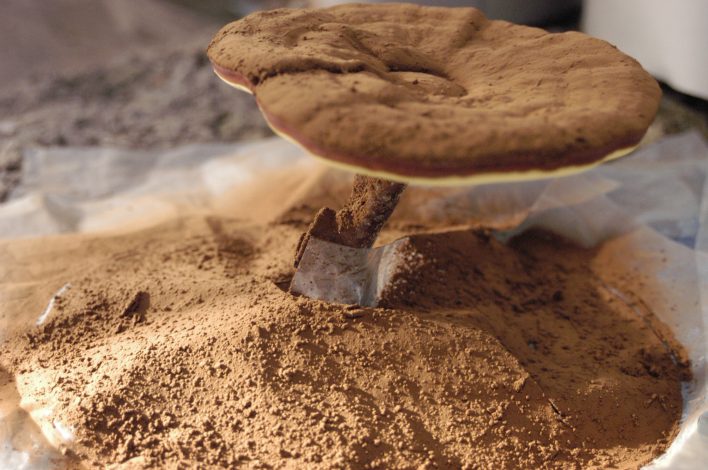
LIVER DISEASE – Reishi has long been a popular traditional treatment for liver diseases and demonstrates wide hepatoprotective properties. It has also traditionally been used in the treatment of hepatitis with several studies confirming benefits in the treatment of Hepatitis B (Soares, 2013).
INSOMNIA/ANXIETY – The traditional name ‘spirit mushroom’ points to the sedative action of its triterpenoid components and many herbalists value its benefits in cases of insomnia. Christopher Hobbs recommends Reishi for deficiency insomnia while Mizuno recommends it for ‘mental stabilisation.
NEURO-PROTECTIVE – Reishi extract has been shown to inhibit beta-amyloid synaptic toxicity with potential benefits in Alzheimer’s disease. Both polysaccharides and triterpenes from G. lucidum exhibit neuroprotective and anticonvulsant effects at levels of 10-80mg/kg while G. lucidum spores have shown ability to protect neurons from apoptosis and improve cognitive dysfunction in animal studies.
ANTI-AGEING – As well as the areas covered above Reishi also shows a broad range of cardiovascular benefits including anti-hyperlipidaemic, anti-hypotensive, and anti-thrombotic effects while a polysaccharide preparation led to improved ECG and lowered chest pain, palpitation and shortness of breath in a double-blind, randomized, multi-centre study (Gao, 2004).
In addition it has been shown to improve blood sugar control and when one considers its diverse array of health benefits the name ‘Mushroom of Immortality’ hardly seems inappropriate!
Aung SK. The Clinical Use of Mushrooms from a Traditional Chinese Medical Perspective. IJMM, 2005;7(3):375-376.
Gao Y, Chen G, Dai X, Ye J, Zhou S. A phase I/II study of ling zhi mushroom Ganoderma lucidum (W.Curt.:Fr.) Lloyd (Aphyllophoromycetideae) extract in patients with coronary heart disease. Int J Med Mushr. 2004;6(4):30.
Jayachandran M, Xiao J, Xu B. A Critical Review on Health Promoting Benefits of Edible Mushrooms through Gut Microbiota.Int J Mol Sci. 2017 Sep 8;18(9).
Jin X, Ruiz Beguerie J, Sze DM, Chan GC.Ganoderma lucidum (Reishi mushroom) for cancer treatment. Cochrane Database Syst Rev. 2016 Apr5;4.
Mahajna J, Dotan N, Zaidman BZ, Petrova RD, Wasser SP. Pharmacological values of medicinal mushrooms for prostate cancer therapy: the case of Ganoderma lucidum. Nutr Cancer. 2009;61(1):16-26.
Soares AA, de Sá-Nakanishi AB, Bracht A, da Costa SM, Koehnlein EA, de Souza CG, Peralta RM. Hepatoprotective effects of mushrooms. Molecules. 2013 Jul 1;18(7):7609-30.
Zhao H, Zhang Q, Zhao L, Huang X, Wang J, Kang X. Spore Powder of Ganoderma lucidum Improves Cancer-Related Fatigue in Breast Cancer Patients Undergoing Endocrine Therapy: A Pilot Clinical Trial. Evid Based Complement Alt Med. Epub 2011 Dec 10.
https://seedsistas.co.uk/product/reishi-mushrooms-myconutri/

